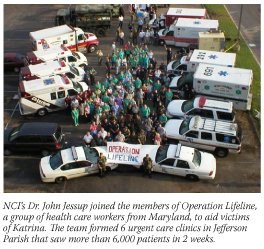 |

Guest Update by Dr. Mark Clanton
Looking Back at Katrina
 Among the sad overabundance of images and news stories that emerged in the wake of Hurricane Katrina, particularly those from my hometown
of New Orleans, I'd like to single out one that spoke volumes about this tragedy. It was a plea
posted on a Katrina message board established by the American Society of Clinical Oncology (ASCO). The title: "Please help my mom." A daughter was searching for her mother's oncologist. "She has carcinoid cancer," the message read, "and I am very worried."
Among the sad overabundance of images and news stories that emerged in the wake of Hurricane Katrina, particularly those from my hometown
of New Orleans, I'd like to single out one that spoke volumes about this tragedy. It was a plea
posted on a Katrina message board established by the American Society of Clinical Oncology (ASCO). The title: "Please help my mom." A daughter was searching for her mother's oncologist. "She has carcinoid cancer," the message read, "and I am very worried."
The cancer community came together quickly to respond to the needs of cancer patients, community oncologists, researchers, and many others affected by Katrina. As the NCI deputy in charge of coordinating NCI's response, I am very proud of our efforts during this disaster. It was especially gratifying to be part of a community-wide response, as NCI staff worked with many organizations and federal, state, and local health agencies to offer relief.
In the days immediately after the hurricane made landfall, Dr. von Eschenbach and I held conference calls with all of the directors of the NCI-designated Cancer Centers to discuss the situation and provide a conduit for those in unaffected regions to offer whatever help they could to those who needed it. A Katrina information portal was launched on the NCI Web site. NCI staff worked with ASCO and others to use the NCI Cancer Information Service's toll-free line (1-800-4-CANCER) to serve as a resource for cancer patients, many of whom were in shelters with limited access to any kind of medical care or even basic communications, to help locate their oncologists or find places where they could receive treatment.
 Meanwhile, 18 NCI staff - as well as staff from other organizations working on Katrina relief - were dispatched to medical facilities in the Gulf Coast. CAPT Leslie Cooper, USPHS, from the Center to Reduce Cancer Health Disparities, for example, was deployed twice and worked with officials from all levels of government to provide care to evacuees in San Antonio and New Orleans and reestablish health care systems. LCDR Mark Roth, USPHS, in NCI's Division of Cancer Epidemiology and Genetics, recently returned from deployment as part of an immunization strike team in Louisiana that administered more than 3,000 immunizations to Katrina evacuees.
Meanwhile, 18 NCI staff - as well as staff from other organizations working on Katrina relief - were dispatched to medical facilities in the Gulf Coast. CAPT Leslie Cooper, USPHS, from the Center to Reduce Cancer Health Disparities, for example, was deployed twice and worked with officials from all levels of government to provide care to evacuees in San Antonio and New Orleans and reestablish health care systems. LCDR Mark Roth, USPHS, in NCI's Division of Cancer Epidemiology and Genetics, recently returned from deployment as part of an immunization strike team in Louisiana that administered more than 3,000 immunizations to Katrina evacuees.
Approximately 7,700 patients in 318 NCI-sponsored clinical trials were affected by Katrina. To aid those involved in the trials, NCI's Cancer Therapy Evaluation Program's toll-free help line was manned 24 hours a day for a month after the hurricane. NCI also worked with other institutions to offer researchers at affected centers temporary placement to continue or, in some cases, resurrect their work.
We are continuing to learn important lessons from this experience. Some are simple things, such as having up-to-date contact information for essential staff. Some require a more substantial effort, such as the need for a portable medical record for cancer patients enrolled in clinical trials.
Many more people than can be named here were involved in the response by NCI and the entire cancer community to this disaster. On behalf of NCI, I thank them for their outstanding and selfless work.
|